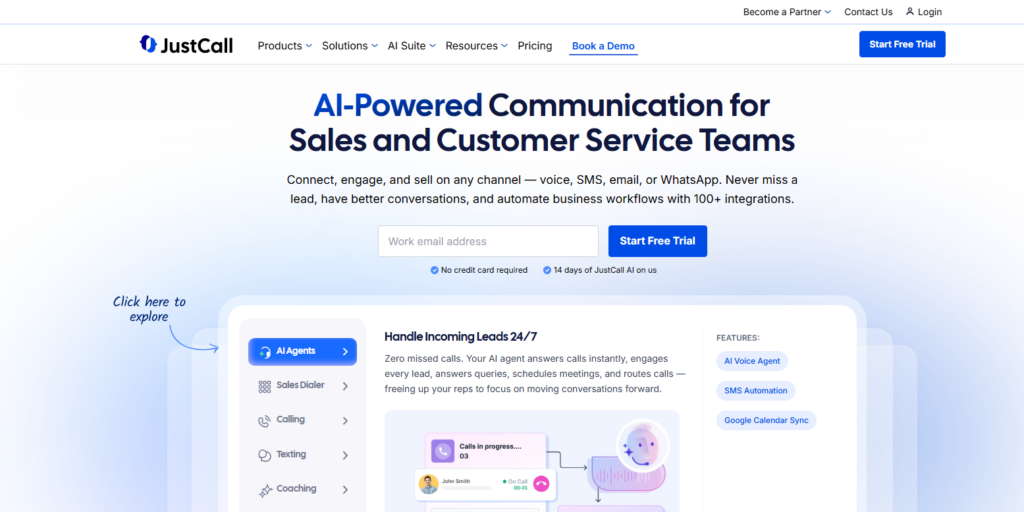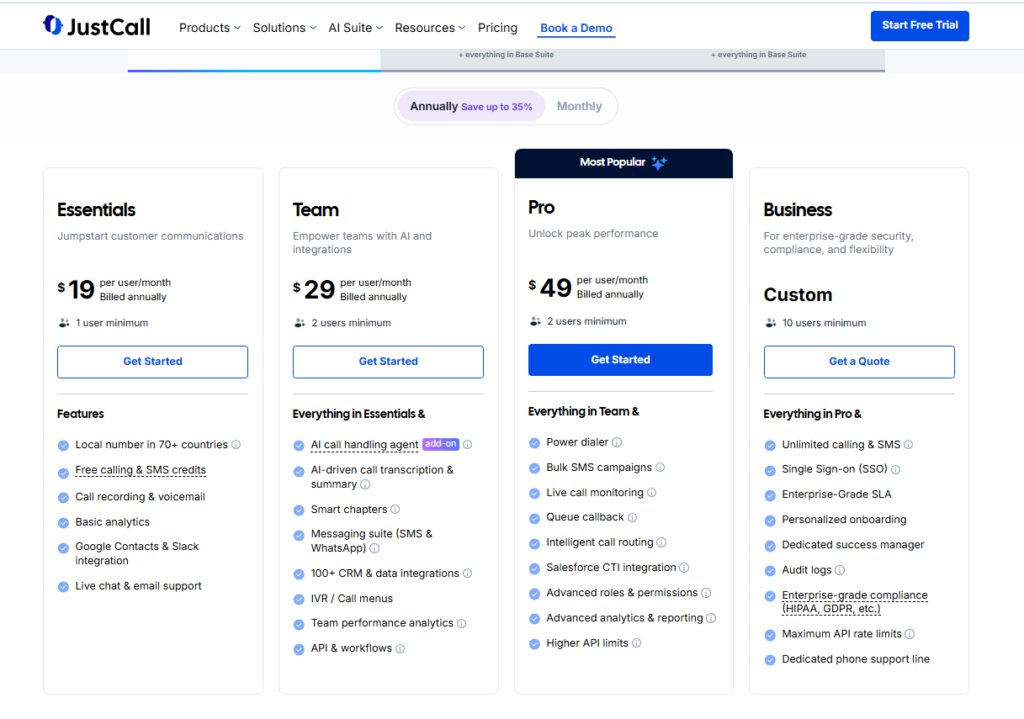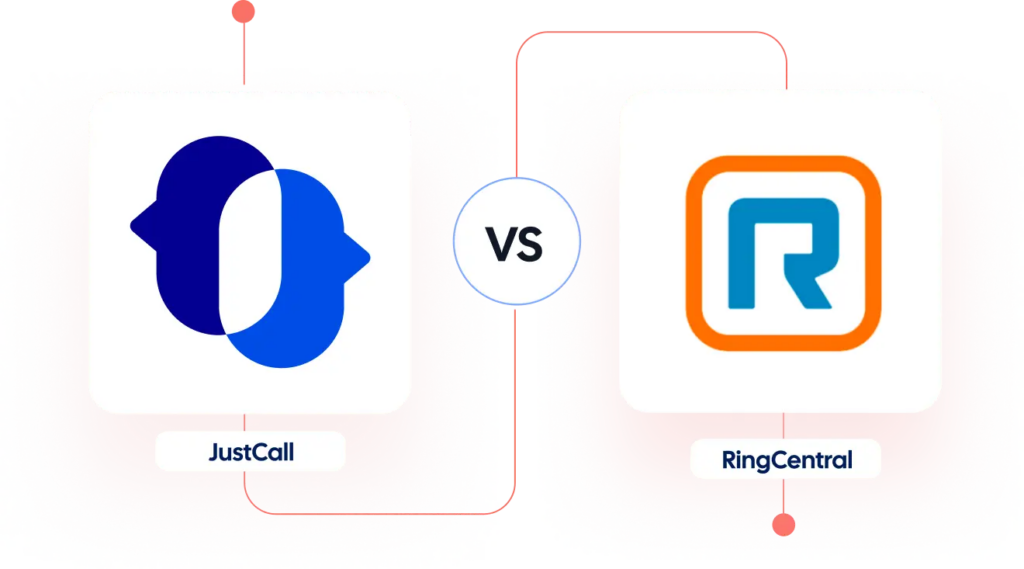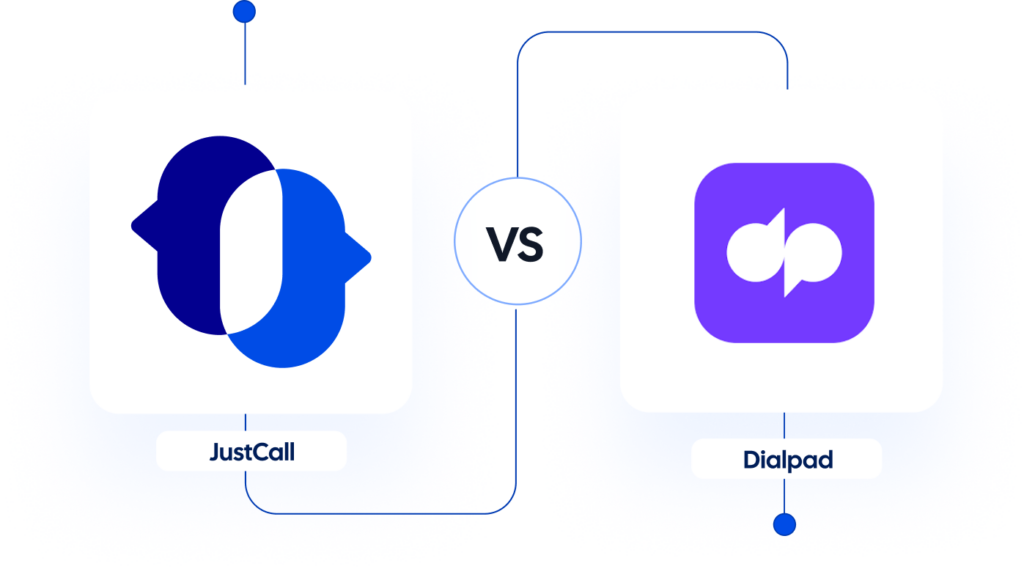JustCall Review 2025: Cloud Phone System Features, Pricing, Pros & Cons
JustCall is a cloud-based business phone system for sales and support teams. Read our 2025 JustCall review to learn about its features, updated pricing plans, pros & cons, and how it compares to alternatives like RingCentral, Aircall, and Dialpad. Discover if JustCall is the best VoIP solution for your business communications.
Overview of JustCall
JustCall is an all-in-one VoIP business phone solution designed for small and mid-sized teams. It enables companies to make and receive calls and texts from anywhere using cloud-based phone numbers. With JustCall, you get a unified platform for voice calls, SMS/MMS, voicemail, and even integrations with email and WhatsApp. The service is trusted by over 6,000 businesses worldwide and offers 100+ integrations with CRM and productivity tools, allowing you to streamline workflows with your existing software. JustCall also incorporates AI features like call transcription, sentiment analysis, and even an AI voice agent that can handle incoming calls, setting it apart from many traditional phone systems.

Pros:
- Multi-Channel Communication: Supports voice calls, SMS/MMS, and WhatsApp in one platform for a unified customer communication experience.
- Robust Feature Set: Includes call recording, IVR menus, call queues, voicemail drop, and advanced sales dialers for outbound calling campaigns.
- Automation & AI: Offers an auto-dialer, SMS automation (bulk texting, drip campaigns), and AI-driven tools like voicemail transcriptions, AI call scoring, and even AI-powered SMS suggestions. These save time and improve agent productivity with real-time insights.
- Extensive Integrations: Natively integrates with 100+ popular apps (CRM, helpdesks, Slack, etc.) including Salesforce, HubSpot, Zendesk, and more. This means calls and texts can be logged automatically and workflows can be triggered in your other systems.
- Global Coverage: Provides local and toll-free phone numbers in 70+ countries, helping your business establish a local presence worldwide.
- Ease of Use & Support: Web and mobile apps are fairly intuitive, and customer support is very responsive (users report getting help within minutes via 24/7 live chat). Onboarding is smooth with a 14-day free trial and easy number porting from other services.
Cons:
- Call Costs: JustCall’s base plans charge calls on a per-minute basis rather than offering unlimited calling by default. While inbound calls to local numbers are free and outbound rates are low, high-volume callers might need to purchase additional minute bundles or consider the Sales Dialer add-on for unlimited outbound calling.
- Mobile App Stability: Some users have noted that the smartphone app can occasionally lag or crash, indicating there’s room for improvement in the mobile experience.
- Limited Advanced Features on Base Plans: Certain advanced capabilities (like power dialers, AI analytics, call barging/whispering, and some integrations such as Salesforce) are only available on higher-tier plans. Smaller teams on the entry plan might miss out on those extras unless they upgrade.
- No Free Tier: JustCall offers a free 14-day trial but no permanent free plan. After the trial, you must subscribe to a paid plan to continue using the service. This is common for professional VoIP services, but some competitors (like Dialpad and RingCentral) also do not have a forever-free tier, whereas a few others might offer limited free versions.
(Overall, the pros of JustCall – especially its rich feature set and integrations – often outweigh its minor cons for most businesses. Next, we’ll dive into its pricing and how it stacks up against top competitors.)
JustCall Pricing and Plans (2025)
JustCall’s pricing is structured across four main plans, each available on a monthly or annual subscription. Annual billing gives a significant discount (around 30-35% off, equivalent to getting a few months free). All plans include the core cloud phone system features; higher tiers add more advanced tools and usage limits. Here’s a breakdown of the plans and current pricing:
- Essentials – $29/user per month (billed monthly), or $19/user per month if billed annually. This entry-level plan provides the foundational features for solopreneurs and small teams. It includes one local phone number per user, unlimited inbound calls, basic call handling (forwarding, voicemail, IVR menus), SMS capabilities, and standard integrations. It’s ideal for startups or businesses that need a professional phone system with core features like call recordings and an IVR, without advanced analytics. (Note: Essentials supports a single user or a very small team.)
- Team – $39/user per month (monthly) or $29/user per month (annual). The Team plan builds on Essentials, allowing for more users and adding enhanced collaboration tools and integrations. It supports features like team messaging, shared contacts or shared inbox, and more extensive CRM integration options for small to mid-size teams. If your team has several agents or departments, this plan is designed to support that with better internal collaboration (for example, assigning calls or texting as tasks).
- Pro – $69/user per month (monthly) or $49/user per month (annual). This plan includes everything in Team, plus all advanced features JustCall has to offer. Pro is suited for larger teams or those needing a full contact-center solution. It comes with priority support and advanced capabilities such as call monitoring (listen/whisper/barge into live calls), power dialer and predictive dialer, SMS bots, Salesforce (and advanced CRM) integrations, API & webhooks for custom workflows, call analytics and coaching insights, and AI features like call transcription & sentiment analysis. In short, Pro unlocks the AI Suite and additional automation, which can significantly boost a sales or support team’s efficiency.
- Business (Enterprise) – Custom pricing on request. This top-tier plan is a custom enterprise package. It’s tailored for organizations with at least dozens of users or specific requirements. Business includes all Pro features and can be further customized (e.g., higher usage limits, dedicated account management, custom SLAs, HIPAA compliance, or other enterprise integrations). If you need features like unlimited calling packages, multiple business SMS numbers per user, advanced security and compliance, or bespoke integration work, the Business plan is the way to go. Pricing is quote-based depending on the scale and add-ons you need.

Included & Extra Costs: Each user license on any plan comes with one free local phone number (you can choose from 70+ country options). Additional numbers can be purchased for about $6 per number per month. Inbound calls to local numbers are free/unmetered, and outbound calls are billed per minute unless covered by a bundle in your plan. JustCall’s call rates are competitive – e.g., outbound calls in the US cost around $0.01/minute. Higher-tier plans (or the Sales Dialer add-on) include bundles of minutes or even unlimited calling to certain regions, which can dramatically reduce or eliminate per-minute charges. All plans also include unlimited texting within fair use limits (SMS segments may be pooled across your team) and unlimited internal team calling. The 14-day free trial lets you test any plan’s features in full before committing.
JustCall vs. Competitors
The cloud telephony space is crowded, so how does JustCall stack up against some well-known alternatives? Below we compare JustCall with three popular business phone solutions: RingCentral, Aircall, and Dialpad. Each competitor has its own strengths, and the best choice depends on your specific needs. We’ll look at pricing, features, and ideal use-cases for each in comparison to JustCall.
JustCall vs RingCentral
RingCentral is often considered the “800-pound gorilla” of business communications – a very established platform (over two decades old) that offers not just VoIP calling, but also video conferencing, team messaging, fax, and more in one unified package. Think of RingCentral as the “Salesforce of the VoIP world” in terms of market presence. It’s a proven solution especially for larger enterprises.

- Pricing: RingCentral’s MVP plans start around $20/user/month (when paid annually) for the Core plan, and go up to $35-$50 for higher tiers with more features. This is roughly on par with (or slightly higher than) JustCall’s pricing for similar feature sets. Keep in mind RingCentral requires a minimum of 2-4 users on some plans. If you’re a very small outfit, JustCall’s ability to support single users on Essentials is an advantage. For larger teams, RingCentral’s cost can add up, whereas JustCall often comes out a bit more affordable for the features offered.
- Features: RingCentral offers a very comprehensive suite of features – including things like video meetings and a 300+ app integration marketplace – which can be overkill if you primarily need a voice solution. JustCall, on the other hand, focuses on voice and text communications (calls and SMS) with related sales/support tools. Both platforms provide call routing, IVR, call recording, analytics, etc. RingCentral’s strength is its reliability and breadth (99.999% uptime SLA, global infrastructure, and advanced admin controls suitable for enterprises). JustCall’s strength lies in its simplicity and modern sales-focused features – for example, JustCall has built-in SMS automation and an auto-dialer for outreach, which require add-ons or third-party tools in RingCentral.
- Ease of Use: RingCentral is powerful but can be complex to configure due to its enterprise focus. JustCall is generally praised for being more straightforward to set up for a small or mid-size team – you can get a number and start calling/texting within minutes. If your organization has dedicated IT staff and needs a full unified communications platform (phones, video, chat in one), RingCentral might be worth the complexity. But if you prefer a leaner solution focused on calls and SMS (with the essential integrations), JustCall offers a faster onboarding with less configuration hassle.
Bottom line: RingCentral is a top choice for enterprises seeking a one-stop UCaaS (Unified Communications as a Service) solution and willing to invest in it. It has name recognition and a very rich feature set. However, for many small and medium businesses, JustCall provides a comparable phone system experience with a more user-friendly approach and often lower cost, especially when you factor in JustCall’s built-in sales and support tools that might be add-ons elsewhere. If you don’t need things like large-scale video conferencing or hundreds of integrations, JustCall can be a more efficient choice while still scaling with your team’s needs.
JustCall vs Aircall
Aircall is a newer VoIP phone solution that, like JustCall, specifically targets modern support and sales teams. Aircall is known for its user-friendly interface and quick setup, making it a favorite for teams that want to get a cloud call center running with minimal IT effort. Customers often praise Aircall’s ease of setup and visually appealing interface.

- Pricing: Aircall’s pricing positions it a bit higher than JustCall. Aircall starts at $30/user/month (billed annually) for its Essentials plan, or $40/user on a monthly basis. Its Professional plan is about $50/user/month (annual) with more advanced features. By comparison, JustCall’s equivalent pricing starts at $19 (annual) or $29 (monthly) for Essentials, making JustCall the more budget-friendly option. Both offer free trials, but neither offers a free forever plan. If budget is a big concern, JustCall provides more value at a lower entry price; Aircall’s higher cost might be justified for some by its polish and reliability.
- Features & Integrations: There’s a lot of overlap in features – both JustCall and Aircall offer core call center capabilities like IVR, call queues, call monitoring, call recordings, and both integrate with popular CRMs and helpdesks. Aircall has 100+ integrations and an open API, similar to JustCall. One difference is SMS: JustCall has two-way SMS and bulk texting capabilities built-in (and even WhatsApp integration), whereas Aircall historically focused on voice. Aircall introduced SMS functionality for US/Canada numbers, but it may not be as advanced in automation as JustCall’s SMS workflows. On the flip side, Aircall is praised for excellent call quality and uptime (they advertise 99.99% uptime) – it’s very robust in pure calling performance. JustCall has edged ahead on new tech features like AI: JustCall offers an AI Voice Agent to handle calls, sentiment analysis of calls, and SMS bots, which as of 2025 are not fully available in Aircall’s feature set. If those AI-driven features are important to you (say, for transcribing calls or automating some interactions), JustCall is ahead of Aircall in that area.
- Usability: Both platforms are easy to use, but Aircall’s interface often gets slightly higher marks for design and simplicity. It’s clean and modern, which reduces the learning curve for new agents. JustCall’s interface is also modern (and has been improving regularly), but with the breadth of features it offers, it can feel a bit more cluttered in comparison. Support-wise, Aircall and JustCall both offer live support; however, many users specifically highlight JustCall’s support as being very fast and helpful, which is a strong point in JustCall’s favor.
Bottom line: Aircall and JustCall are direct competitors in the SMB phone system space. Aircall might win out if you prioritize a slightly more polished UI and rock-solid call quality, and don’t mind paying a premium for it. It’s a great choice for teams that mainly need voice calls with standard features in a sleek package. JustCall, meanwhile, offers more bang for your buck – you get voice + SMS, more advanced outbound campaigning tools, and cutting-edge AI features at a lower price point. For many growing businesses, that combination of features and value makes JustCall a very compelling alternative to Aircall.
JustCall vs Dialpad
Dialpad is another popular cloud communication platform that has made a name for itself by infusing AI into the calling experience. Dialpad provides a unified communications solution (voice, video, messaging) but is especially known for its AI voice transcription and call analysis features. It’s a strong option for small businesses and startups, often cited for its affordable pricing.

- Pricing: Dialpad is one of the more budget-friendly options among top providers. It offers a Standard plan at $15/user/month (billed annually) and a Pro plan at $25/user/month (annual), with an Enterprise plan available for large clients. This means Dialpad’s base price undercuts JustCall’s base ($19) by a few dollars for annual plans. Even Dialpad’s monthly rates ($20 Standard, $35 Pro) tend to be a bit lower than JustCall’s equivalent monthly rates. So if absolute lowest cost is your goal, Dialpad has an edge for very small teams. However, pricing isn’t the whole story – it’s important to compare what you get in each plan.
- Features: Dialpad’s standout features revolve around AI and unified communications. Every Dialpad call can be transcribed in real-time, with searchable transcripts and even sentiment analysis. JustCall’s Pro plan offers similar AI transcription and sentiment features, so in that regard they are comparable if you opt for higher tiers. Dialpad also includes a built-in video conferencing and team chat app (because it aims to be an all-in-one UCaaS solution like RingCentral). JustCall does not offer its own video meetings or internal team chat – it focuses on voice calls and texts, and would integrate with other tools for video/chat if needed. On the sales side, JustCall provides a power dialer and SMS automation which Dialpad’s base product lacks (Dialpad has a separate product Dialpad Sell with sales dialer features at extra cost). Integrations-wise, Dialpad has fewer native integrations (~70 out-of-the-box) compared to JustCall’s 100+ and RingCentral’s extensive catalog. For instance, both integrate with Salesforce, HubSpot, etc., but JustCall might have deeper integration for certain sales tools and more niche apps. If your workflow relies on a specific integration, it’s worth checking compatibility.
- Ease of Use: Dialpad is frequently praised for its clean interface and ease of deployment, much like JustCall. Both are relatively easy to get started with. Dialpad’s mobile and desktop apps are well-designed and the learning curve is low. One consideration is support: Dialpad’s Standard plan support is mostly web/chat based (no 24/7 phone support on the lowest tier), whereas JustCall provides 24/7 live chat support on all plans and prioritizes support on higher tiers. User reviews indicate JustCall’s support is very hands-on during onboarding (they’ll even assist with porting numbers and CRM setup), which can be a differentiator if you value strong customer service.
Bottom line: If you need a budget-friendly phone system with excellent AI transcription and perhaps built-in video meetings, Dialpad is a great choice. It’s especially suitable for small businesses that want a slick, AI-powered phone service at a low price. On the other hand, JustCall offers more specialized outbound sales tools (power dialers, bulk SMS) and a broader set of integrations in its category. JustCall might be preferable if your team heavily relies on SMS/texting in addition to calls, or if you want an all-in-one contact center platform with features like automation and multiple communication channels. Essentially, Dialpad is like a swiss-army knife for communications with a focus on AI, whereas JustCall is a powerhouse for voice and SMS outreach with a focus on sales acceleration and support workflows. Consider trialing both – note that both Dialpad and JustCall have free trials – to see which interface and feature mix your team prefers.
Final Verdict: Is JustCall Worth It?
JustCall is a top-tier VoIP solution for businesses that need a blend of voice calling, SMS capabilities, and advanced sales/support features in one platform. It brings together the functionality of a phone system and a contact center at a price point that often beats legacy providers. Given its rich feature set (from IVR and call routing to power dialers and AI analytics) and strong integration options, JustCall can cater to a wide range of use cases – from a two-person startup needing a professional phone number, to a 50-person sales team running outbound campaigns.
The platform has earned positive ratings (around 4.2 out of 5 stars on average in user reviews) and is continuously improving. In 2024, G2 recognized JustCall as one of the best customer service products, and the company has been growing rapidly (now serving 6,000+ customers). Many users specifically laud JustCall’s customer support and frequent feature updates – critical factors that indicate the product is evolving to meet customer needs.
That said, no solution is one-size-fits-all. If your team purely needs voice calling without the frills, or conversely if you need a full unified communications suite with video meetings, you might weigh other options. But if you’re looking for a flexible business phone system that excels in both calls and texts, with automation to boost your team’s productivity, JustCall is absolutely worth considering. Its ability to integrate with your CRM, log every call/text, and even add AI insights means you get a lot of value for the cost.
Our recommendation: Take advantage of the 14-day free trial to see JustCall in action for yourself. Play with the call flows, try the SMS features, and integrate it with your CRM to get a real feel. With its competitive pricing (especially annually) and strong feature set, JustCall stands out as one of the best in its class for 2025.
👉 Ready to streamline your business communications? Try JustCall free for 14 days and see how it can transform your calling and texting workflows.
